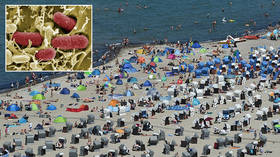Killer bacteria leaves woman dead after beach trip in Germany

Lethal microbes in the Baltic Sea have killed a woman in Germany in the first fatality of its kind this year, as soaring summer temperatures create the perfect conditions for the dangerous pathogen to rapidly multiply.
Europe is roasting under a heatwave, driving many to seek refuge in the sea, but for one elderly beachgoer from the state of Mecklenburg-Western Pomerania, a cool summer swim ended in tragedy.
The woman contracted a strain of the deadly Vibrio bacteria, according to the state’s Office for Health and Social Welfare. There are several varieties of the pathogen, with some belonging to the so-called ‘flesh eating’ bacteria. Other strains can cause Cholera, a severe intestinal illness.
The Vibrio bacteria can enter the human body through various ways including open wounds, which may lead to major infection and sepsis. It is particularly dangerous for those with a compromised immune system or chronic liver disease.
Also on rt.com Man dies from FLESH-EATING bacteria after swimming in FloridaThe elderly woman fatally sickened by the microbe was thought to suffer from immune deficiencies, according to German media.
Currently, the environment along Germany’s Baltic coastline is close to ideal for the organism, which thrives in warm, brackish water.
“Vibrio bacteria multiply especially at a salt content of 0.5 percent and above a temperature of about 20 degrees Celsius [68 degrees Fahrenheit],” said Martina Littmann, head of Mecklenburg-Vorpommern’s health department.
If you like this story, share it with a friend!














